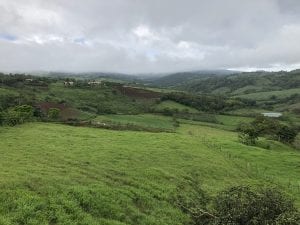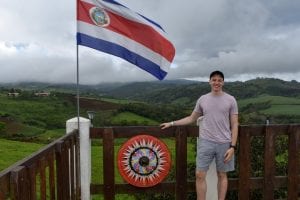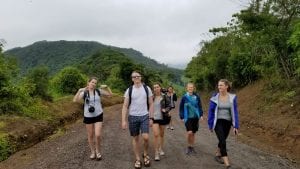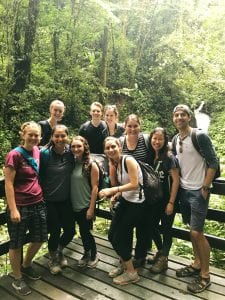Most groups follow the same pattern in Tuckman’s stages of group development (forming -> storming -> norming -> performing) when learning to work with one another and the GMI Cohort is no different. If anything, the fact that we all lived together for exactly 2 months has expedited that process quite a bit. GMI Recruitment day in the Spring and GMI bootcamp in May mostly consisted of “So what school did you go to?” “What did you major in?” “Where are you from?” and few conversations delving deeper than that -the forming stage. As we were forced to interact with one another through 5-hour bus rides, close living spaces, and the fact we are the only gringos within a 5-mile radius at any given time, we got to know each other much better. This cohabitation quickly led to the storming, norming and performing stages. Granted, most of my arguments (storms) involved The Office or British Reality TV shows, but I did get pretty good at finding out which food makes people less likely to storm: Snickers/Kiwi for Annie, Honey Bunches of Oats for Razi, obscure fruit for Christine, ginger tea/McDonald’s fries for Hannah, pastries sans gluten for Theresa, any food for Sylvie when she is hungry and “may literally die”, dulce de leche rolls for Kevin, *insert vegetable here* for Paula, and pizza for Carolyne (the only anti-storming snack that doesn’t matter is Sarah’s because I’ll eventually try and eat the rest of whatever it is and we’ll storm anyways).
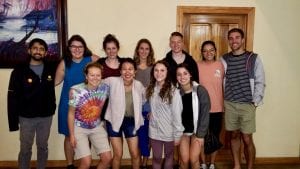 Unlike most Gringos who spend a Summer in Costa Rica, we actually spent the summer working. Granted, we did hit quite a few beach, volcano and jungle hotspots, but only on the weekends. This was my first time working for a large company and I have to say it was nothing like I expected it to be. In fact, almost every GMIer this summer has had a very different professional experience. We were initially selected into our internships by submitting our resumes at the beginning of the summer, and I remember reading the words “research and development” and thinking it would be similar to academic research. I then remember googling Establishment Labs and was then very confused about what, exactly, I would be researching and developing with a background in Cell Biology, based on the nature of the company. I’m not sure what I had in mind about what my first day would look like, but I do know I was completely wrong:
Unlike most Gringos who spend a Summer in Costa Rica, we actually spent the summer working. Granted, we did hit quite a few beach, volcano and jungle hotspots, but only on the weekends. This was my first time working for a large company and I have to say it was nothing like I expected it to be. In fact, almost every GMIer this summer has had a very different professional experience. We were initially selected into our internships by submitting our resumes at the beginning of the summer, and I remember reading the words “research and development” and thinking it would be similar to academic research. I then remember googling Establishment Labs and was then very confused about what, exactly, I would be researching and developing with a background in Cell Biology, based on the nature of the company. I’m not sure what I had in mind about what my first day would look like, but I do know I was completely wrong:
- First of all, the people were much nicer than I expected. Now, I don’t mean I thought they were going to be mean or rude, I just figured they would afford the interns a standard amount of workplace respect- soft smiles and polite head nods in the hallway. Turns out, “Pura Vida” (the national motto/slogan/catchphrase) also means that everybody is your best friend and should be treated as such.
- Secondly, I assumed that whatever work I completed as an intern would be more for my benefit than the company’s -just simple tasks that introduced me to the industry and did not make a real impact. On the contrary, I was thrown into one of the RDI divisions and (while, yes, I did work with a large amount of paperwork, reports, Excel sheets and PowerPoints), I was pulled into many product development meetings where my opinion was asked for, considered, and taken into account.
- I thought that because I was now working for a (relatively) large company, there would be a towering amount of bureaucracy and I would only see the inside of my assigned office. Again, I was wrong! The executive management of the company loves innovation, and recognizes that much of that comes from those conducting tests, developing ideas, and designing products. On our first day, most of the executives came over to introduce themselves and told us if there was any part of the company we wanted to learn about that they would be more than happy to schedule talks, trainings and meetings. Just because we work for a large company does not mean there isn’t ample room to thrive.
This past week, I’ve begun to wrap up the work that I’ve been completing over the summer and hand off my projects to my co-workers and new interns. I just finished a report I have been working on for a while that outlines the proposed prototypes I built, based off a team brainstorming session a few weeks ago. Now that I have the designs for each, the legal department will spend the next few weeks combing through similar patents to determine which prototype ideas are possible based on current IP restrictions and which need to be modified. In addition to prototyping, we just finished detailing a potential preclinical study for one of our devices. Designing studies is challenging, because it requires an in-depth look at what you want to achieve from your study and what results you will need to prove device success and safety to a regulatory body (e.g. the FDA). One fun thing I’ve learned is that the FDA is not a fan of short documents, nor summaries.
Costa Rica, as a whole, is an incredible place, somewhere you can’t truly experience in only two months (even though we tried our best!). For anyone planning to spend a significant of time down here, or future GMIers, here are ten quick lessons and best practices that I came across (in no particular order):
- Bring a rain jacket and/or an umbrella. Summer is the rainy season, and that means it rains every day.
- Wear sunscreen! A hard lesson to learn was four years spent in the tundra (where UV B rays can’t reach you for much of the year) meant I had a cool 0% of melanin in my skin and got initially got sunburned walking from the bus to my apartment. Geography fun fact: Costa Rica is closer to the Equator than Canada, who knew?!
- Embrace Casado, Gallo Pinto and Chifrijo (essentially, various recipes of beans & rice) because it will be your life.
- Spanish a little rusty and don’t know how to continue a conversation? Just say “Pura Vida”, it can be used in 1,000 contexts and chances are you’ll hit one.
- Bugs are your friends! Okay, maybe not always, but they’re here anyways so make your peace with them.
- Just because something is close by does not mean it won’t take 2 hours to get to on the road. Civil planning is not what Latin America is known for.
- Not a big coffee drinker? Not partaking in the CR hot beverage of choice would be like going to Rome and saying “Oh, I don’t eat pasta”.
- Visit as many jungles, beaches and waterfalls as you can! There is no shortage of any of those, so there is no excuse. Not to mention you will see sloths and monkeys, so that’s another plus.
- Everyone here is a “Tico”, so an easy way to connect with the locals is to shout “Vamos Ticos!” at any soccer game or television set.
- Pura Vida. Not only is it a conversation filling phrase (hello, goodbye, thank you, you’re welcome, okay, etc.), it is also a lifestyle. Costa Rica is home to various Blue Zones -areas of the world where people live much longer than average. It effectively means “Hakuna Matata”, and many attribute the longer lifespan of those in these areas to their emphasis on positive mental health. Pura Vida!
I don’t want to leave, but I’m excited for GMI’s next steps and future challenges at Rice. I will never forget my time here, nor the people I have met and the work that we have done.
Pura Vida

